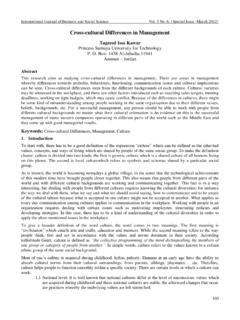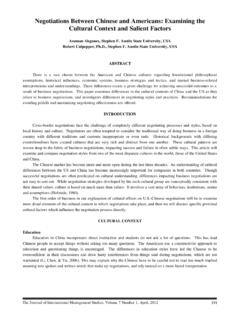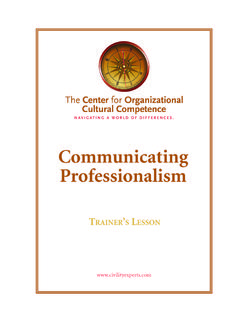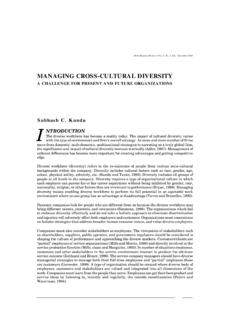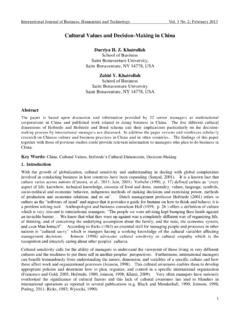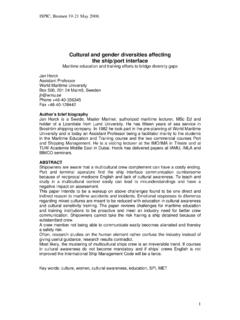Transcription of An Evolutionary Software Project Management Maturity …
1 Interdisciplinary Journal of Information, Knowledge, and Management Volume 2, 2007 Editor: Kathy Lynch An Evolutionary Software Project Management Maturity Model for Mauritius Aneerav Sukhoo, Andries Barnard, Mariki M. Eloff, and John A. Van der Poll University of South Africa, Pretoria, South Africa Abstract Software Project Management is a relatively recent discipline that emerged during the second half of the 20th century (Kwak, 2003). Many of the Software Project Management methodologies available today were developed in Western/European countries and research showed that there was a need to formalise a Software Project Management framework for developing countries, in particular Africa (Muriithi & Crawford, 2003).
2 Based on surveys and discussions with Software professionals, a methodology for Software pro-ject Management is being proposed. The methodology is based on a Maturity model as Mauritius is faced with a shortage in skilled professionals. So far, few organisations in Mauritius have been found to be using Software Project Management methodologies developed in Western/European countries. Most Maturity models, for example Capability Maturity Model Integration (CMMI) and Kerzner s Maturity model, have five Maturity levels. The trend is towards the development of Maturity models that have fewer Maturity levels. For example, the Organisational Project Man-agement Maturity Model (OPM3) and Prince 2 Maturity Model have been developed with three Maturity levels.
3 Similarly, the proposed Evolutionary Software Project Management Maturity Model (ESPM3) has three Maturity levels and a continuous process improvement group of key process areas (KPAs). ISO 9001:2000 is chosen as the quality Management system and each KPA is mapped onto the plan-do-check-act (PDCA) cycle. The model is conceptually represented as a conical structure to better display the Evolutionary development of KPAs. KPAs, which are focus areas to be considered for Project Management , are developed until they attain Maturity at a certain level. As organisations have to be responsive to their environments, these KPAs may require fur-ther changes even after they have reached Maturity . A continuous process group of KPAs helps in adapting to changes in environment.
4 In order to test the proposed methodol-ogy, one case study has been included. The application of the methodology to the Project could not be discussed in detail in this paper. The development of KPAs in an organisation takes time and the case study was only a snapshot of the application of the methodology. Material published as part of this publication, either on-line or in print, is copyrighted by the Informing Science Institute. Permission to make digital or paper copy of part or all of these works for personal or classroom use is granted without fee provided that the copies are not made or distributed for profit or commercial advantage AND that copies 1) bear this notice in full and 2) give the full citation on the first page.
5 It is per-missible to abstract these works so long as credit is given. To copy in all other cases or to republish or to post on a server or to redistribute to lists requires specific permission and payment of a fee. Contact to request redistribution permission. Software Project Management Maturity Model 100 Keywords: Software Project Management , Software development, Maturity model, Evolutionary process, Project Management methodology. Introduction There is ample evidence that the inherent principles of Project Management have been practiced already for thousands of years (Kwak, 2003). The results are that many human achievements, for example the pyramids of Egypt and the Great Wall of China, are recognised as wonders of the present-day world.
6 It is unfortunate that the Manhattan Project (Kwak, 2003), although consid-ered as a successful human undertaking (the development of the atomic bomb) at a later stage caused the loss of lives on a large scale. Apart from the construction and engineering areas, applied principles of Project Management made inroads into virtually all avenues of work by encompassing sectors such as the military, social and community development, medicine, agriculture and education to name just a few (Kwak, 2003). Today, the impact of Project Management is most profound in the area of Informa-tion Technology (Gray & Larson, 2000) where new hardware and Software products are con-stantly flooding the world market. Increased pressure to reduce cost and delivery time in a highly global and competitive environment has given due credit to Project Management principles, tech-niques and tools.
7 Software Project Management , in particular, is an area of research with a view to achieve higher levels of quality and to improve both cost and schedule estimates. This is evident from frequent new releases of Project Management methodologies like the Project Management Body of Knowledge (PMBOK Guide, 2004), PRojects IN Controlled Environment (PRINCE) (Central Computer and Telecommunications Agency [CCTA], 2002) and the Capability Maturity Model Integration (CMMI Product Team, 2002). These methodologies were studied prior to the development of a suitable methodology for Mauritius. A Software Project Management methodol-ogy is being proposed since it has been noted that a Software Project has certain specificities that are different from traditional engineering projects.
8 Hughes and Cotterell (2006) argued in favour of the specificities of managing Software projects. Some pertinent differences between Software projects and traditional engineering projects were also elaborated on by Sukhoo, Barnard, Eloff and Van der Poll (2004b). A plethora of Project Management methodologies is now available and many methodologies are subject to continuous improvement. Project Management methodologies are generally generic in nature, in that they cut across various disciplines and are used in many countries. Some studies, for example Muriithi and Crawford (2003) and Stuckenbruck and Zomorrodian (1987), have re-vealed that such methodologies are not necessarily universally applicable because factors like economic rationalities are too often assumed and legal, political as well as cultural and religious variations occur across nations and cultures.
9 Hofstede s dimensions as applied to African coun-tries (Muriithi & Crawford, 2003), Kuwait (Aladwani, 2002) as well as Mexico, India and Russia (Rao, 2004) have been discussed in terms of high power distance and high uncertainty avoidance as compared to Western/European countries. Open discussions are not favoured and low toler-ance for ambiguities is noted in developing countries. It is plausible to expect that these factors may negatively influence the successful outcome of Software projects, particularly in developing economies, as these factors are seldom taken into account by a particular methodology. By and large, developing countries constantly face problems of insufficient skilled staff, funds, and po-litical and social incentives (Muriithi & Crawford, 2003).
10 Mauritius, for example, is facing such problems at a crucial moment in its history as the Government has embarked on a vision to de-velop it into a Cyber Island while at the same time allowing Information and Communication Technologies (ICT) to emerge as the fifth pillar of the economy besides sugar, tourism, textile and the financial services (Eid, 2002). Sukhoo, Barnard, Eloff, & Van der Poll 101 In particular, some of the problems affecting the Mauritian IT sector are: lack of skilled human resources (BPO Secretariat, 2005) high labour mobility (BPO Secretariat, 2005) lack of training (BPO Secretariat, 2005) ageing population unstable economic situation (Muriithi & Crawford, 2003) methodologies of Western/European origins are not completely suitable and are too ex-pensive to adopt for most organizations (Muriithi & Crawford, 2003) lack of Management commitment lack of soft skills in Management of projects organizations are characterised by tall hierarchical structures (Muriithi & Crawford, 2003) existing methodologies are considered to be too bureaucratic.
